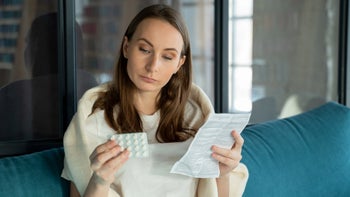
Can You Mix Trazodone and Alcohol? Plus, 3 More FAQs About This Risky Combination
Key takeaways:
It’s best to avoid combining trazodone and alcohol because taking them together increases your risk of dizziness and drowsiness.
More seriously, combining trazodone and alcohol increases your risk of falls, slowed breathing, and overdose.
To be safe, wait at least 2 days after your last trazodone dose before drinking alcohol.
Table of contents

Trazodone is a prescription-only medication that’s FDA approved to treat depression. However, it’s more commonly used off-label to treat insomnia (trouble sleeping).
Combining trazodone and alcohol isn’t a good idea. But why? Below, we’ll answer four frequently asked questions about trazodone and alcohol.
1. Can you mix trazodone and alcohol?
It’s not a good idea to mix trazodone and alcohol. There’s a known interaction between these two substances.
Search and compare options
Dizziness and drowsiness are two of the most common trazodone side effects. And alcohol can have similar effects. Taking them together can increase your risk of:
Falls and injuries: Research indicates that trazodone increases the risk of falls and injuries from falls (like fractures) in older adults. This has been seen even with low dosages used to treat insomnia. Drinking alcohol while taking trazodone can increase these risks.
Overdose: Slowed breathing and overdoses have happened in people taking trazodone in combination with alcohol.
Depression: Alcohol may make depression worse. So if you’re taking trazodone or another antidepressant for depression, it may not be as effective if you drink alcohol.
Liver problems: In rare cases, trazodone can cause liver problems. Chronic alcohol use can also have long-term impacts on your liver, leading to conditions such as fatty liver and cirrhosis. Combining trazodone and alcohol long term may cause more harm to your liver than taking either of these substances alone.
2. Is having one to two drinks OK?
We don’t know what amount of alcohol, if any, is considered safe to drink while taking trazodone. For this reason, you should assume that no amount of alcohol is safe.
Without trazodone in your system, having one or two alcoholic drinks may not have a negative impact on you. But, if you’re taking trazodone, it’s difficult to predict what effect alcohol will have. This is why it’s safest to avoid the combination altogether.
3. Can you drink alcohol after you’ve stopped taking trazodone?
You may be able to drink alcohol after you’ve stopped taking trazodone. But waiting at least 2 days after your last dose is safest. This is because trazodone sticks around in your body for at least a day after you take it. Drinking alcohol before trazodone is fully cleared from your system can cause increased drowsiness and dizziness.
Good to know: If you’ve been taking trazodone regularly, stopping treatment abruptly can cause withdrawal symptoms. This includes flu-like symptoms, headache, and nausea. You may also experience dizziness, trouble sleeping, or anxiety. In rare cases, more serious symptoms like extreme mood changes or confusion can occur. So don’t stop taking trazodone without talking to your prescriber first.
4. Are there other antidepressants or sleep aids that are a better option if you drink alcohol?
Beyond trazodone, there are other antidepressants and sleep aids that can interact with alcohol. Like trazodone, these medications may cause excessive drowsiness and/or dizziness when combined with alcohol. This includes the following antidepressant medications:
Selective serotonin reuptake inhibitors (SSRIs) like sertraline (Zoloft)
Serotonin and norepinephrine inhibitors (SNRIs) like venlafaxine (Effexor XR)
Tricyclic antidepressants (TCAs) like amitriptyline
Hydroxyzine (Vistaril)
Alcohol can also interact with these sleep medications:
Benzodiazepines like temazepam (Restoril)
Z-drugs like zolpidem (Ambien)
Ramelteon (Rozerem)
Doxepin (Silenor)
Diphenhydramine (ZzzQuil, Benadryl)
Like with trazodone, we don’t know what amount of alcohol, if any, is safe to drink with these types of medications. That’s why it’s best to avoid drinking altogether when taking them. If you want to have an occasional drink while taking an antidepressant or sleep aid, talk to your prescriber, so they can help you weigh the risks. Your prescriber may suggest certain medications over others if they know you’re likely to drink alcohol while taking them.
The bottom line
It’s a good idea to avoid combining trazodone and alcohol. Individually, each of these substances can cause drowsiness and dizziness. When combined, your risk of these side effects is increased. More seriously, your risk of slowed breathing, overdose, and falls is also higher.
In general, other antidepressants and sleep aids should also be avoided with alcohol. If you want to have an occasional drink while taking trazodone or other medication that causes drowsiness, talk to your prescriber about the risks. One medication may be preferred over another if you plan to continue drinking alcohol during treatment.
Why trust our experts?


References
Amari, D. T., et al. (2022). Falls, healthcare resources and costs in older adults with insomnia treated with zolpidem, trazodone, or benzodiazepines. BMC Geriatrics.
Bronskill, S. E., et al. (2018). Low-dose trazodone, benzodiazepines, and fall-related injuries in nursing homes: A matched-cohort study. Journal of the American Geriatric Society.
Jung, Y. S., et al. (2022). Risk of fall-related injuries associated with antidepressant use in elderly patients: A nationwide matched cohort study. International Journal of Environmental Research and Public Health.
Laughren, T. P., et al. (2009). Application number: 22-411 medical review(s). Center for Drug Evaluation and Research.
National Institute of Diabetes and Digestive and Kidney Diseases. (2020). Trazodone. LiverTox: Clinical and Research Information on Drug-Induced Liver Injury.
Was this page helpful?
Related Articles
Browse medications
View AllResearch prescriptions and over-the-counter medications from A to Z, compare drug prices, and start saving.
















